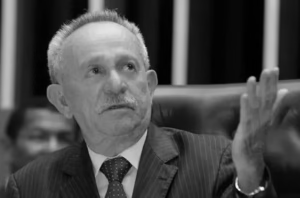Donald Trump officially assumed the role of the 47th President of the United States on January 20, 2025, in a ceremony held at the Capitol in Washington, D.C. This event marked his return to power, making him the only president to serve two non-consecutive terms since Grover Cleveland. The inauguration was witnessed by an impressive list of guests, including former presidents, global leaders, tech executives, and celebrities, underscoring the global significance of the occasion.
The day began with a religious ceremony at St. John’s Episcopal Church, near the White House, where Trump and his family attended prayers accompanied by Vice President JD Vance. Following the service, the focus shifted to the Capitol, where Trump took the oath of office, administered by Supreme Court Chief Justice John Roberts, in a setting that symbolized the enduring strength of American democracy. The event highlighted the resilience of U.S. political institutions, even amid internal divisions.
A ceremony marked by influential guests
Trump’s inauguration brought together an impressive array of prominent figures. Among the political attendees were former presidents Barack Obama, Bill Clinton, and George W. Bush, accompanied by former first ladies Michelle Obama, Hillary Clinton, and Laura Bush. The presence of these leaders emphasized the democratic continuity and historical relevance of the event, despite a highly polarized political landscape.
On the international front, the ceremony featured figures such as Argentina’s President Javier Milei and Italy’s Prime Minister Giorgia Meloni. Their attendance underscored Trump’s diplomatic ties with nations aligned with his political and economic vision. These moments highlighted the importance of diplomacy in addressing global challenges and fostering strategic cooperation.
Executives from leading tech companies were also in attendance. Elon Musk, CEO of Tesla and SpaceX; Sundar Pichai, CEO of Google; Mark Zuckerberg, CEO of Facebook; and Jeff Bezos, founder of Amazon, participated in the event, symbolizing the critical role of technology in Trump’s administration. These leaders have played pivotal roles in driving innovation and digital transformation, central themes in the government’s agenda.
The Trump family in the spotlight
Donald Trump’s family took center stage at the inauguration, reinforcing their political and media influence. Ivanka Trump, the president’s eldest daughter, attracted attention as she arrived at the religious ceremony. Barron Trump, the youngest son, also attended, drawing public interest during the proceedings.
Throughout Trump’s first term, his family held strategic roles. Ivanka and Jared Kushner, for instance, served as close advisors on economic policies and international relations. Their visibility at the event reaffirmed the expectation that they will continue to play significant roles during the second term.
Technology and innovation at the core of the agenda
The presence of top tech executives at the inauguration clearly indicated the administration’s focus on technological innovation. Elon Musk and Sundar Pichai, for example, were seen interacting during the event, highlighting the private sector’s role in advancing areas like artificial intelligence, cybersecurity, and renewable energy.
During his first term, Trump maintained a complex relationship with the tech industry, advocating for innovation while calling for stricter regulations on social media platforms. His second term is expected to continue addressing these issues, balancing economic, ethical, and political interests.
President Trump’s Celebratory Victory Rally https://t.co/MCKNpDh8kG
Cultural connections and celebrity presence
In addition to political leaders and business moguls, the inauguration drew the attention of numerous entertainment figures. Well-known celebrities attended the ceremony, emphasizing the intersection of popular culture and politics in the United States. Trump, with his background as a television personality, has a unique ability to merge these worlds, amplifying his global visibility.
This cultural presence underscores the symbolic and media impact of political events in the U.S., where the relationship between politics and entertainment is often leveraged as a tool for public engagement.
Historical significance of Trump’s inauguration
Donald Trump’s inauguration as the 47th President of the United States marked a unique moment in the country’s political history. He joins Grover Cleveland as the only presidents to return to office after a break, reflecting the strength of his political base and the enduring impact of his rhetoric and policies.
During his first term, Trump focused on tax reforms, trade agreement renegotiations, and border security. His second term presents new challenges, including post-pandemic economic recovery, technological advancements, and managing international relations in an increasingly multipolar world.
Symbolic moments of the event
The inauguration was filled with significant moments that captured global attention. The arrival of Barack Obama and Bill Clinton at the Capitol alongside their spouses symbolized unity and continuity amidst divisions. Additionally, interactions between global leaders and business executives during the ceremony highlighted the interconnectedness of politics and economics in the 21st century.
The religious ceremony at St. John’s also held special meaning, representing the beginning of a day of peaceful transition and reaffirmation of democratic values. Trump and JD Vance, his vice president, emphasized the importance of faith and unity for the nation’s future.
Expectations for the second term
Trump’s second term begins in a challenging environment, with expectations focused on areas like economic recovery, national security, and technological innovation. The presence of global leaders and prominent figures at the event signals efforts to strengthen alliances and seek collaborative solutions to contemporary issues.
With a solid political base and a strategic cabinet, Trump is positioned to implement policies aimed at consolidating economic growth and reaffirming the United States’ global leadership.

Donald Trump officially assumed the role of the 47th President of the United States on January 20, 2025, in a ceremony held at the Capitol in Washington, D.C. This event marked his return to power, making him the only president to serve two non-consecutive terms since Grover Cleveland. The inauguration was witnessed by an impressive list of guests, including former presidents, global leaders, tech executives, and celebrities, underscoring the global significance of the occasion.
The day began with a religious ceremony at St. John’s Episcopal Church, near the White House, where Trump and his family attended prayers accompanied by Vice President JD Vance. Following the service, the focus shifted to the Capitol, where Trump took the oath of office, administered by Supreme Court Chief Justice John Roberts, in a setting that symbolized the enduring strength of American democracy. The event highlighted the resilience of U.S. political institutions, even amid internal divisions.
A ceremony marked by influential guests
Trump’s inauguration brought together an impressive array of prominent figures. Among the political attendees were former presidents Barack Obama, Bill Clinton, and George W. Bush, accompanied by former first ladies Michelle Obama, Hillary Clinton, and Laura Bush. The presence of these leaders emphasized the democratic continuity and historical relevance of the event, despite a highly polarized political landscape.
On the international front, the ceremony featured figures such as Argentina’s President Javier Milei and Italy’s Prime Minister Giorgia Meloni. Their attendance underscored Trump’s diplomatic ties with nations aligned with his political and economic vision. These moments highlighted the importance of diplomacy in addressing global challenges and fostering strategic cooperation.
Executives from leading tech companies were also in attendance. Elon Musk, CEO of Tesla and SpaceX; Sundar Pichai, CEO of Google; Mark Zuckerberg, CEO of Facebook; and Jeff Bezos, founder of Amazon, participated in the event, symbolizing the critical role of technology in Trump’s administration. These leaders have played pivotal roles in driving innovation and digital transformation, central themes in the government’s agenda.
The Trump family in the spotlight
Donald Trump’s family took center stage at the inauguration, reinforcing their political and media influence. Ivanka Trump, the president’s eldest daughter, attracted attention as she arrived at the religious ceremony. Barron Trump, the youngest son, also attended, drawing public interest during the proceedings.
Throughout Trump’s first term, his family held strategic roles. Ivanka and Jared Kushner, for instance, served as close advisors on economic policies and international relations. Their visibility at the event reaffirmed the expectation that they will continue to play significant roles during the second term.
Technology and innovation at the core of the agenda
The presence of top tech executives at the inauguration clearly indicated the administration’s focus on technological innovation. Elon Musk and Sundar Pichai, for example, were seen interacting during the event, highlighting the private sector’s role in advancing areas like artificial intelligence, cybersecurity, and renewable energy.
During his first term, Trump maintained a complex relationship with the tech industry, advocating for innovation while calling for stricter regulations on social media platforms. His second term is expected to continue addressing these issues, balancing economic, ethical, and political interests.
President Trump’s Celebratory Victory Rally https://t.co/MCKNpDh8kG
Cultural connections and celebrity presence
In addition to political leaders and business moguls, the inauguration drew the attention of numerous entertainment figures. Well-known celebrities attended the ceremony, emphasizing the intersection of popular culture and politics in the United States. Trump, with his background as a television personality, has a unique ability to merge these worlds, amplifying his global visibility.
This cultural presence underscores the symbolic and media impact of political events in the U.S., where the relationship between politics and entertainment is often leveraged as a tool for public engagement.
Historical significance of Trump’s inauguration
Donald Trump’s inauguration as the 47th President of the United States marked a unique moment in the country’s political history. He joins Grover Cleveland as the only presidents to return to office after a break, reflecting the strength of his political base and the enduring impact of his rhetoric and policies.
During his first term, Trump focused on tax reforms, trade agreement renegotiations, and border security. His second term presents new challenges, including post-pandemic economic recovery, technological advancements, and managing international relations in an increasingly multipolar world.
Symbolic moments of the event
The inauguration was filled with significant moments that captured global attention. The arrival of Barack Obama and Bill Clinton at the Capitol alongside their spouses symbolized unity and continuity amidst divisions. Additionally, interactions between global leaders and business executives during the ceremony highlighted the interconnectedness of politics and economics in the 21st century.
The religious ceremony at St. John’s also held special meaning, representing the beginning of a day of peaceful transition and reaffirmation of democratic values. Trump and JD Vance, his vice president, emphasized the importance of faith and unity for the nation’s future.
Expectations for the second term
Trump’s second term begins in a challenging environment, with expectations focused on areas like economic recovery, national security, and technological innovation. The presence of global leaders and prominent figures at the event signals efforts to strengthen alliances and seek collaborative solutions to contemporary issues.
With a solid political base and a strategic cabinet, Trump is positioned to implement policies aimed at consolidating economic growth and reaffirming the United States’ global leadership.







